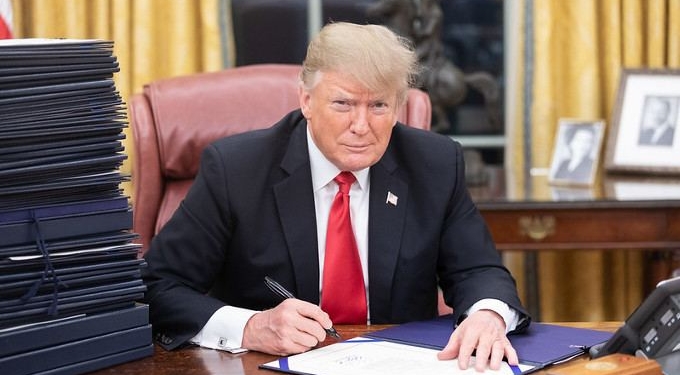
By Jessica Corbett | Common Dreams
A comprehensive report released Wednesday shines a spotlight on the “pro-corporate, anti-worker agenda” that has defined President Donald Trump's first term by detailing 50 ways his administration has made life harder for working people with repeated attacks on labor rights and protections.
“The Trump administration's mishandling of the Covid-19 pandemic marks the administration's most glaring failure of leadership, but it is in no way distinct from its approach to governing since President Trump's first day on the job.”
—Celine McNicholas, EPI
The Economic Policy Institute (EPI) report features his “most egregious attacks on working people” since the president took office in 2017 after campaigning as their champion. The review comes as the country endures the coronavirus pandemic and resulting economic crisis—and as Trump prepares to face off against Democratic presidential nominee Joe Biden in November.
While the country's Covid-19 death toll and caseload—now more than 196,000 and 6.6 million, respectively—have mounted in recent months, Biden has taken aim at the president's mismanagement of the pandemic, tweeting Tuesday that “Donald Trump is not responsible Covid-19, but he is responsible for his failed response and for lying to the American people.”
EPI director of government affairs and labor counsel Celine McNicholas, who co-authored the new report, said in a statement Wednesday that “the Trump administration's mishandling of the Covid-19 pandemic marks the administration's most glaring failure of leadership, but it is in no way distinct from its approach to governing since President Trump's first day on the job.”
Throughout Trump's tenure as president, McNicholas added, “the administration has systematically promoted the interests of corporate executives and shareholders over those of working people and failed to protect workers' safety, wages, and rights.”
During the pandemic, the Trump administration has failed to “support adequate fiscal stimulus” or “act to protect the health of workers,” the report notes, but even before the current crisis began, the administration “engaged in persistent efforts to take away workers' healthcare.”
While the administration—despite the risk to workers amid the pandemic—allowed poultry plants to boost line speeds and the president used executive power to keep meat-processing plants open, Trump made his position on workplace safety clear long before the coronavirus hit.
Under Trump, Occupational Safety and Health Administration “workplace inspection activity has fallen relative to the previous two administrations,” according to EPI. “OSHA also currently has the lowest number of inspectors in the history of the agency. Further, more complex health-related inspections are occurring less frequently.”
Since the pandemic struck the U.S., the agency “has refused to issue any required measures—via an emergency temporary infectious disease standard—to protect workers from the virus,” the report notes. “OSHA even rejected a petition by unions representing affected workers and by the AFL-CIO for mandatory rules to protect workers from exposure to the coronavirus on the job.”
As report co-author and EPI policy associate Margaret Poydock put it: “The pandemic has merely provided the administration another opportunity to continue its attacks on workers' rights. Instead of instituting policies to protect the nation's essential workers, the administration has undermined workplace safety standards.”
With a nod to a potential Biden victory in this year's general election, Poydock added “it is critical that a new administration works with the same diligence to reverse Trump's anti-worker policies and also advance a workers' agenda that provides working people with the rights and protections they need and deserve.”
"50 reasons" could easily be 5,000, but important info to know in this new report:https://t.co/CG1ntOuu8B
— Dan #PROAct #PROAct #PROAct Mauer (@dan_mauer) September 16, 2020
The report also highlights how the Trump administration has taken aim at the “centerpiece” of the National Labor Relations Act, pushed to lower wages for already poorly paid migrant farmworkers, “completed the U.S. Chamber of Commerce's (anti-worker) wish list,” encouraged offshoring of jobs with a law that also gave major tax breaks to the wealthy, and made various other moves that negatively affect workers.
EPI senior fellow Lynn Rhinehart pointed out that the report, which she co-authored, contradicts Trump's 2016 promises to support working people if elected.
“President Trump claimed he would fight for workers, but his actions and policies have cost workers wages, undermined their right to organize unions, and failed to protect their health and safety on the job,” Rhinehart said. “This report shows the real record and exposes Trump's repeated attacks on workers.”
Some labor leaders and organizers never bought into his claims. National Nurses United executive director Bonnie Castillo wrote for Common Dreams on Labor Day:
In 2016, Trump sold himself as a champion of workers; nurses know it was just a façade. Working people across the country have suffered from decades of policies that led to deindustrialization, declining real wages, the transfer of wealth to corporations and the economic elite, deregulation, and an all-out assault on unions. Trump, corporate America's BFF, was never going to reverse that.
His record reads like a Wall Street and Chamber of Commerce wish list. Rather than being a champion of workers, he has acted as a champion of libertarian, far-right ideologues, legislators, donors, and think tank allies.
Castillo, whose union members are working on the front lines of the ongoing and deadly pandemic, contrasted Trump's record on labor with that of Biden, who backs the Protecting the Right to Organize Act (PRO Act) and has a platform acknowledging the “war on organizing, collective bargaining, unions, and workers.”
The union leader concluded that “nurses understand the urgency of ending the disastrous policies and behavior of President Trump this November. But our work doesn't stop there; past the election, we will continue to mobilize and organize for the transformative social changes all workers, and patients, sorely need.”
Our work is licensed under a Creative Commons Attribution-Share Alike 3.0 License. Feel free to republish and share it widely.





![Everything You Ever Wanted to Know About 9/11 Conspiracy Theory in Under 5 Minutes [VIDEO] | by James Corbett](https://consciouslifenews.com/wp-content/uploads/2018/09/911-a-conspiracy-theory-350x250.jpg)










